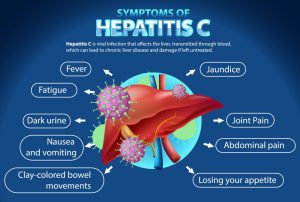Hepatitis C is a viral disease that impacts the liver and can lead to major health problems if left untreated. Millions of people around the world are living with this silent disease, often without knowing they are infected. This blog will explore in detail what Hepatitis C is, its causes, symptoms, available treatments, and whether it can be cured. We’ll also touch on the status of the Hepatitis C vaccine and how to prevent this infection.
What is Hepatitis C?
Hepatitis C is a liver disease caused by the hepatitis C virus (HCV). It primarily affects liver cells, leading to inflammation and sometimes long-term liver damage. Over time, chronic hepatitis C virus infection can result in liver cirrhosis, liver failure, or liver cancer.
Unlike hepatitis A and B, hepatitis C is mainly transmitted through contact with infected blood. It is a major public health issue globally, but advances in hepatitis C treatment have made it a largely manageable — and often curable — condition.
What Causes Hepatitis C?
The primary cause of hepatitis C is exposure to the blood of an infected person. Common ways the hepatitis C virus spreads include:
- Sharing needles or syringes for drug use
- Receiving unscreened blood transfusions or organ transplants (especially before the 1990s)
- Accidental needle-stick injuries in healthcare settings
- Being born to a mother with hepatitis C
- Sharing personal things like razors or toothbrushes that could be contaminated with infected blood.
Note: Hepatitis C is not spread through casual contact, hugging, or sharing food.

Hepatitis C Symptoms
Hepatitis C virus infection is often asymptomatic in the early stages. Many people live for years without knowing they are infected, during which time the virus quietly damages the liver.
When symptoms do occur, especially in chronic Hepatitis C, they may include:
- Fatigue and weakness
- Jaundice (yellowing of the skin and eyes)
- Dark urine
- Abdominal pain or discomfort, especially in the upper right side
- Loss of appetite
- Nausea and vomiting
- Itchy skin
- Swelling in the legs and abdomen (in serious cases)
Because of these nonspecific symptoms, routine screening is vital, especially for people at higher risk.

Hepatitis C Diagnosis
If you’re experiencing any of the above Hepatitis C symptoms, or if you believe you may have been exposed to the virus, your doctor will recommend blood tests to detect HCV.
Common diagnostic steps include:
- HCV Antibody Test: This determines whether you’ve ever been exposed to the Hepatitis C virus.
- HCV RNA Test: Confirms active infection by detecting the virus’s genetic material in the blood.
- Genotype Testing: Identifies the strain of the virus to help determine the most effective treatment.
Additional tests like liver function tests, imaging, or even liver biopsy may be used to assess liver damage.

Is Hepatitis C Curable?
One of the most encouraging developments in modern medicine is the fact that Hepatitis C is curable for the vast majority of patients.
Direct-acting antiviral (DAA) medications, cure rates exceed 95%, even in patients with advanced liver disease.
Hepatitis C Treatment Options
Historically, hepatitis C treatment involved long courses of interferon injections and medicines, both of which had significant side effects. Fortunately, new direct-acting antivirals (DAAs) have revolutionized how we treat hepatitis C.
These oral hepatitis C medications target the virus directly, stopping it from multiplying in the body. Treatment is typically:
- Taken once a day
- Completed in 8 to 12 weeks
- Has minimal side effects
- Highly effective in curing the infection

Who Should Get Tested for Hepatitis C?
The Centers for Disease Control and Prevention (CDC) recommends that all adults aged 18 years and older get tested for hepatitis C at least once in their lifetime. People with the following risk factors should be tested more frequently:
- History of intravenous drug use
- Received blood products before 1992
- Long-term dialysis
- HIV infection
- Born between 1945 and 1965 (a high-prevalence group)
Early testing can save lives by enabling timely treatment and preventing liver damage.
Is There a Hepatitis C Vaccine?
One of the biggest challenges in preventing the spread of hepatitis C is the absence of a hepatitis C vaccine. While vaccines exist for hepatitis A and B, scientists have not yet developed an effective vaccine for hepatitis C due to the virus’s high genetic variability.
However, research is ongoing, and several vaccine candidates are under development. Until a vaccine becomes available, prevention efforts focus on reducing risk factors and increasing awareness.

Preventing Hepatitis C Virus Infection
Since there’s no vaccine, preventing hepatitis C virus infection involves minimizing exposure to infected blood. Here are some practical tips:
- Never share needles or syringes
- Use sterile equipment for tattoos or piercings
- Avoid sharing razors, toothbrushes, or nail clippers
- Ensure that medical and dental instruments are properly sterilized
- Practice safe sex, especially with multiple partners or in high-risk groups
- Follow safety protocols in healthcare settings
For those already diagnosed, avoiding alcohol and maintaining a liver-healthy lifestyle can slow disease progression.
Living with Hepatitis C
A hepatitis C diagnosis is not a life sentence. With the availability of highly effective treatments, most people can achieve a cure and live healthy, normal lives. Managing your health, avoiding liver toxins, and staying engaged with healthcare providers are key steps toward recovery.
Support groups and mental health resources can also be beneficial, as the emotional burden of chronic illness can be significant.
Conclusion:
Hepatitis C is a serious but curable disease. With timely diagnosis, access to modern hepatitis C treatment, and commitment to lifestyle changes, most patients can eliminate the virus and protect their liver health for the future.
Although there’s no hepatitis C vaccine yet, prevention through awareness and safe practices can significantly reduce the risk of infection. If you or someone you know is at risk, don’t wait—get tested today.
Key Takeaways:
- What is hepatitis C? – A liver infection caused by the hepatitis C virus (HCV).
- What causes hepatitis C? – Primarily blood-to-blood contact from needles, transfusions, or medical exposure.
- Is hepatitis C curable? – Yes, in more than 95% of cases with new oral medications.
- Hepatitis C symptoms – Often silent, but can include fatigue, jaundice, and abdominal pain.
- Hepatitis C treatment – Direct-acting antivirals that are easy to take and highly effective.
- No hepatitis C vaccine yet, but prevention is possible through safe practices.

